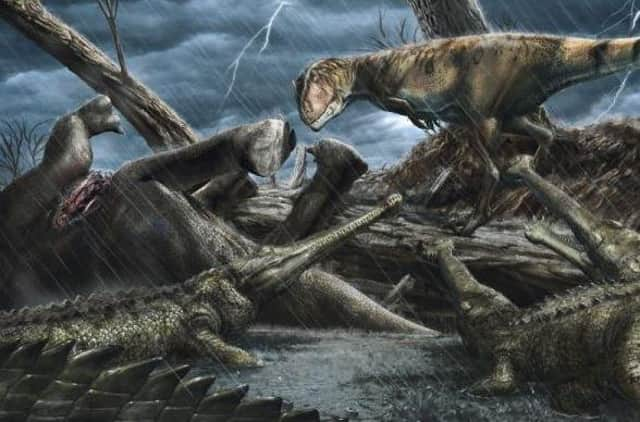University of Portsmouth unveils 'most dangerous place on the planet’


Researchers from the University of Portsmouth teamed up with other scientists investigating an area of rock formations in south-eastern Morocco, known as the Kem Kem Group.
The proclamation comes after the discovery of the fossilised remains of three of the largest predatory dinosaurs ever known.
Advertisement
Hide AdAdvertisement
Hide AdThe largest was the sabre-toothed Carcharodontosaurus which was over eight metres in length with an enormous jaw containing eight inch serrated teeth.
Dr Nizar Ibrahim, who was working with the university, said: ‘This was arguably the most dangerous place in the history of planet Earth - a place where a human time-traveller would not last very long.’
The area was home to these enormous predators due to the abundance of potential food including massive fish.
Professor David Martill from the University of Portsmouth added: ‘This place was filled with absolutely enormous fish, including giant coelacanths and lungfish. There was also an enormous freshwater shark called Onchopristis with the most fearsome of rostral teeth like barbed daggers, but beautifully shiny.’
Advertisement
Hide AdAdvertisement
Hide AdREAD ALSO: University of Portsmouth nursing student writes and records song paying tribute to NHS staff
A message from the Editor
Thank you for reading this story on portsmouth.co.uk. While I have your attention, I also have an important request to make of you.
With the coronavirus lockdown having a major impact on many of our advertisers - and consequently the revenue we receive - we are more reliant than ever on you taking out a digital subscription.
Subscribe to portsmouth.co.uk and enjoy unlimited access to local news and information online and on our app. With a digital subscription, you can read more than 5 articles, see fewer ads, enjoy faster load times, and get access to exclusive newsletters and content. Visit our Subscription page now to sign up.
Advertisement
Hide AdAdvertisement
Hide AdOur journalism costs money and we rely on advertising, print and digital revenues to help to support them. By supporting us, we are able to support you in providing trusted, fact-checked content for this website.
Comment Guidelines
National World encourages reader discussion on our stories. User feedback, insights and back-and-forth exchanges add a rich layer of context to reporting. Please review our Community Guidelines before commenting.